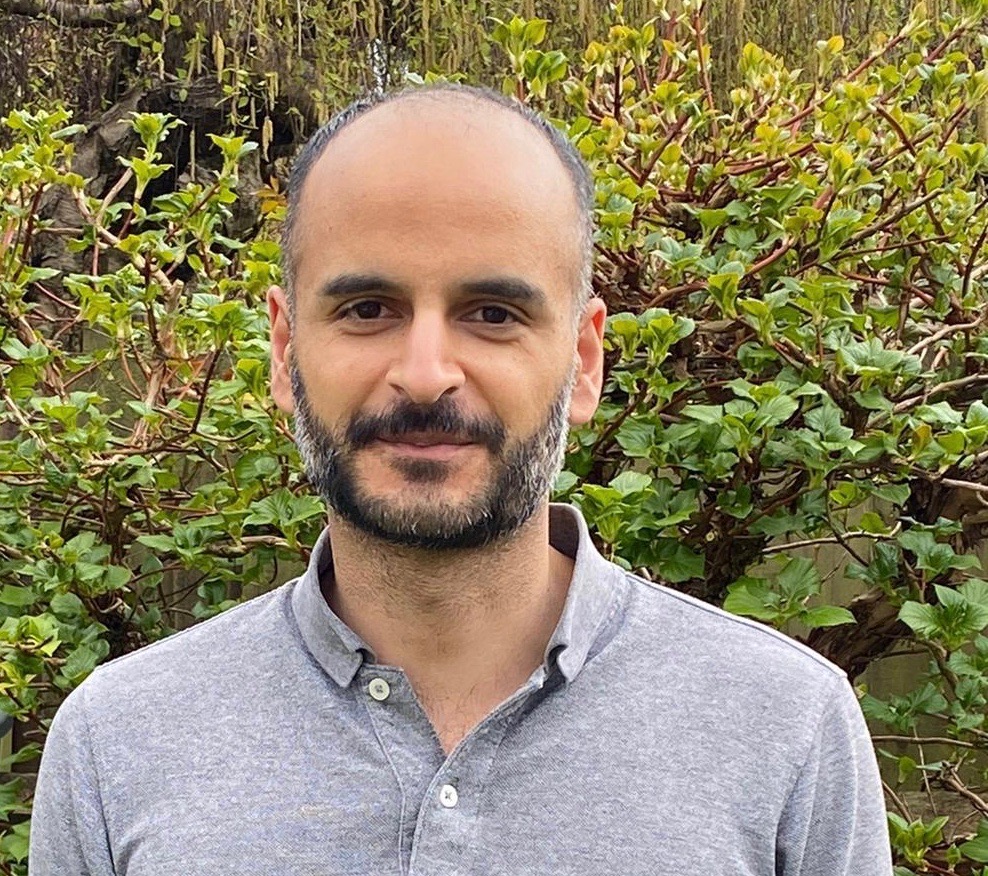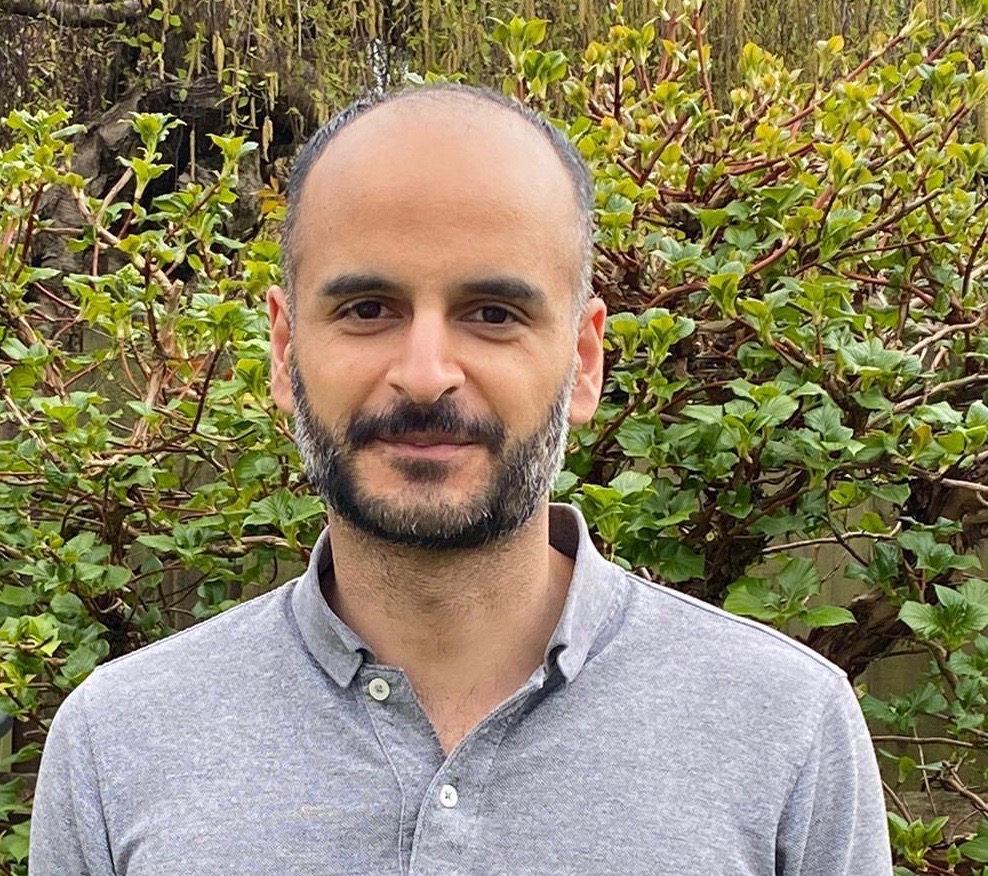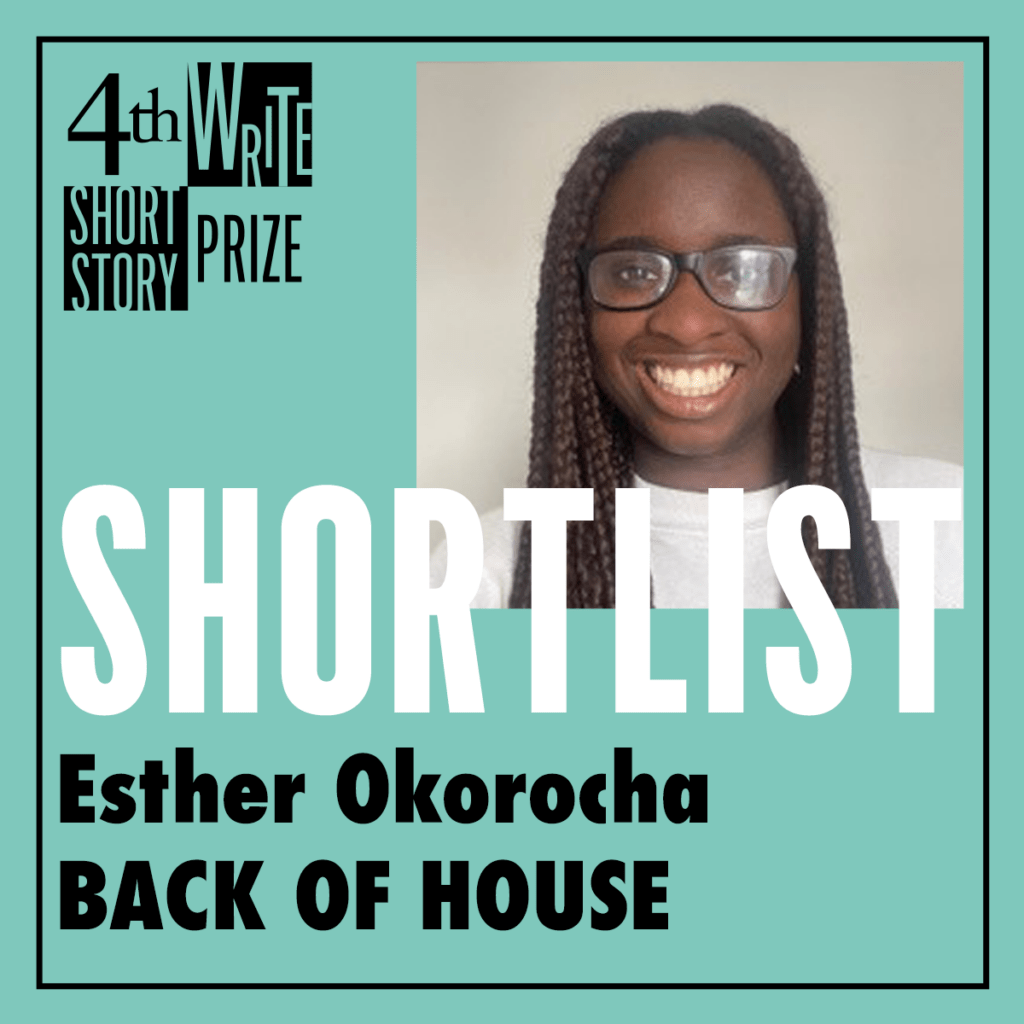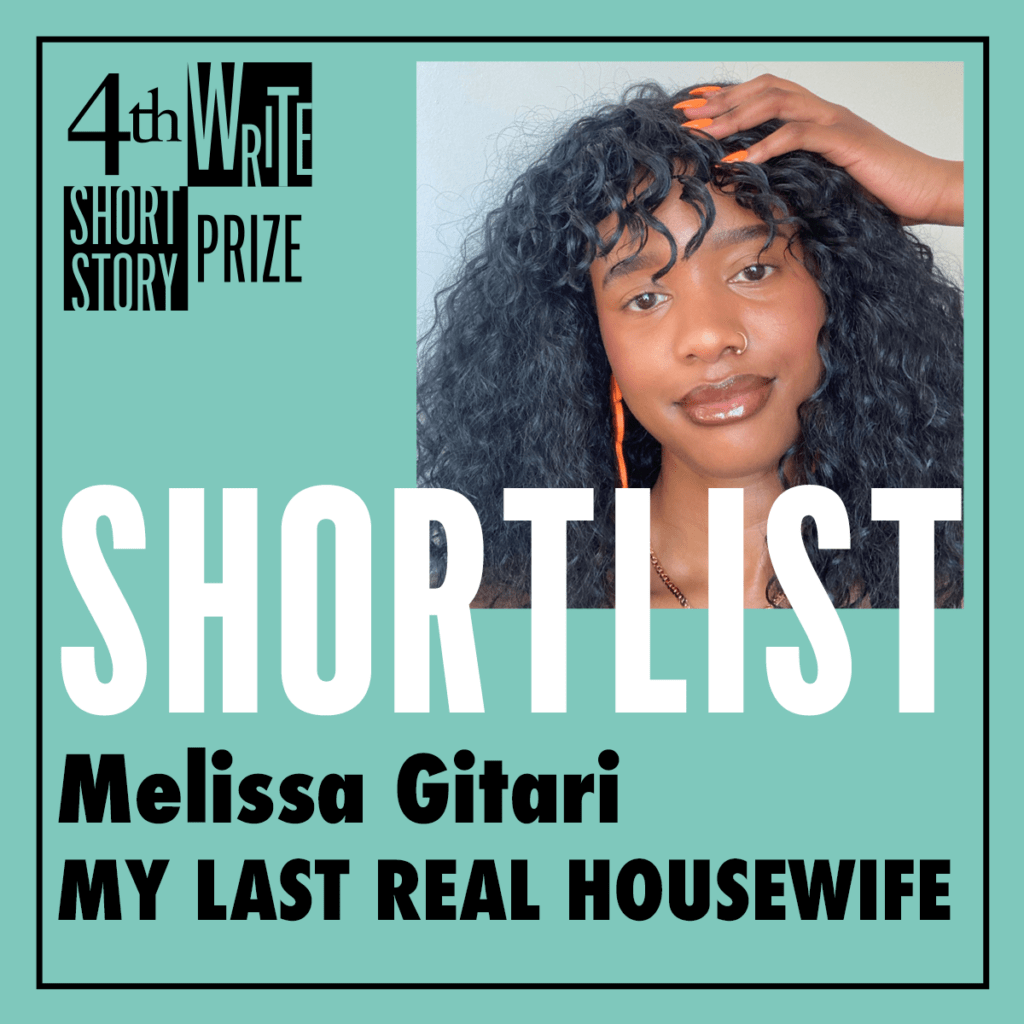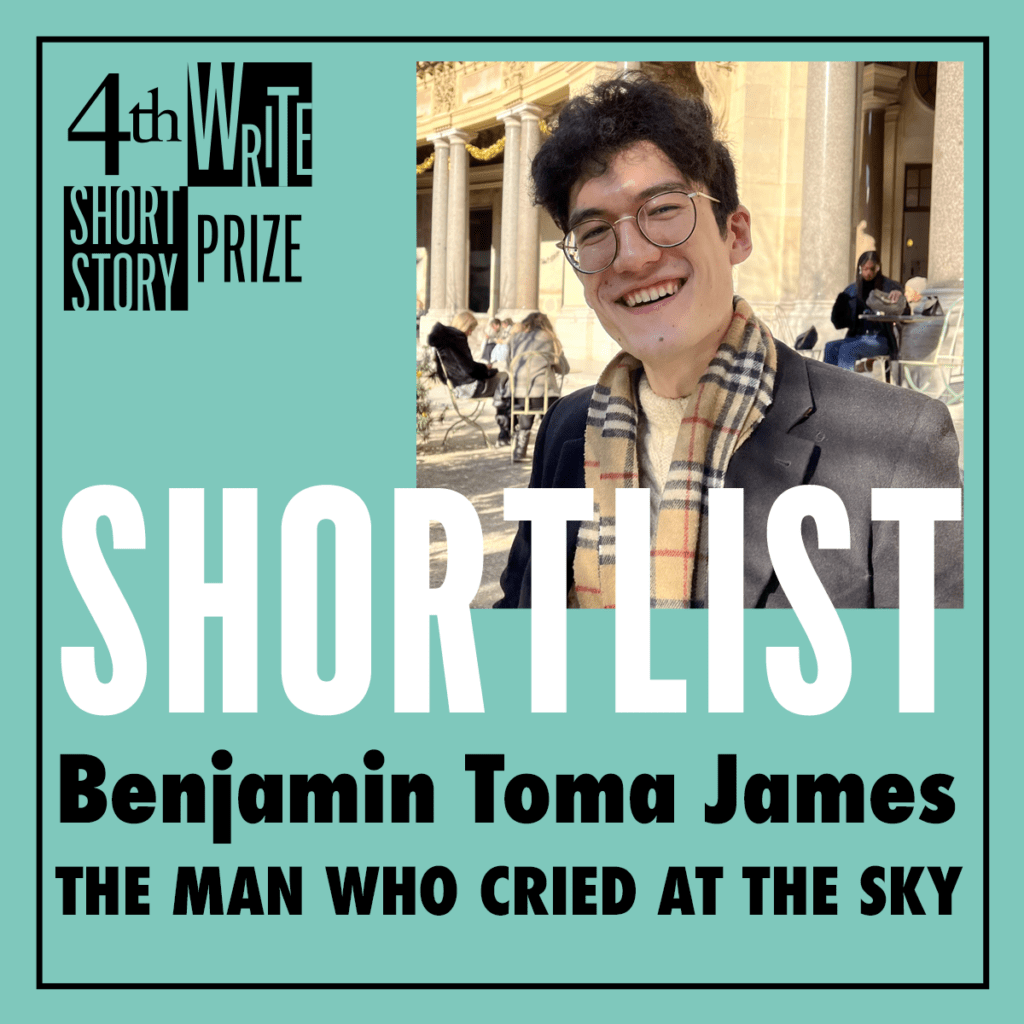Amaan is the author of the poetry collection At Hajj (Penned in the Margins, 2017). His poems have appeared in various publications including The Guardian, Poetry Review and Poetry London. He is a Ledbury Poetry Critic 2021 and a doctoral student at Royal Holloway, University of London. Follow him at @hyder_amaan on Twitter.
Postpositions
Postpositions comprises thirty reflections by an unnamed narrator concerning inheritance, queerness and late nineties-early noughties television.
1.
Only after saying them out loud do I realise the first lines are a couplet – ‘I have something to say, / I want to tell you all that I’m gay.’ But the failure of my speech is in both the content and form. In our family, Urdu is better than English for poetry. Among the foremost Urdu poets – Iqbal, Ghalib, Mir – Ghalib is favoured, and Ghalib’s poetry cannot really be translated into English. Translation is considered mitigation. And what is poetry, anyway, in this situation? We are at the dinner table. My mother and father don’t know where to look; my sisters and brother-in-law sit quietly while I continue with my speech. Later, when we are alone, my parents tell me that they are worried that my brother-in-law will tell his parents about my coming out. He is from our community. If he does tell his family, the news will spread like wildfire across the diaspora. In preparation for this day, I have spent time considering my own expulsion from the family, which has not happened, but I have spent no time considering my parents possible expulsion from their community, which may yet take place.
2.
Gay means outside the community, outside what is known. But being a Hyderabadi is being an outsider, is it not? We are Hyderabadis. We claim difference all the time. We are Indians – but we are not like other Indians. And we are not like other Hyderabadis. We are Muslims. Our language is Urdu. We don’t know Telugu. My father can’t read Hindi. Our food is bitter and hot. Our meat biryanis are unmatched.
Our ancestors are supposedly Middle Eastern merchants who came to India to do business. We have our particular history.
3.
There is the state of Hyderabad’s attempted independence from India following India’s independence in 1947. But the Hyderabadi independence movement was crushed by Delhi. Independence is a matter for the historical record. According to a book written by my father’s elder brother, Hyderabad is still on the agenda of the UN Security Council. Had Hyderabad succeeded in its endeavour, it would have been a sovereign state, overseen by a Muslim minority. As a young man growing up in England two decades before the Millennium, being from a minority meant something quite different. We lived in a town an hour’s drive from London. We were the only Asian family for a few streets. When I became aware of the family history, I kept its affinities to myself. Hyderabad was eventually broken up into three smaller states. My grandparents’ generation encouraged their children to move away from India – to the West. My parents came to England and, to anyone who didn’t know, they were indistinguishable from all the other immigrants who had arrived from the subcontinent.
4.
A classmate sings ‘How Patel’ instead of ‘How Bizarre’ whenever he sees me. ‘How Bizarre’ is a song in the charts at the time. It is about a car that gets stopped by the police. It is the nineties. It is a school with red-brick buildings and playing fields and a thousand boys in blazers and ties. I tell the classmate who sings the song that my name isn’t Patel. He says that he thought it was. We are about the same size so we are put together in PE. We practise kicking a football to each other. There is another classmate of ours who is half-Indian. When the class finds out that his middle name is an Indian name, they begin to use it to address him. ‘Vijay! Vijay!’ they chant. This makes him angry. He turns furious; he begins to lash out. Soon some of the bigger boys, the ones we don’t reply to, start calling this boy Vijay whenever they speak to him. He can’t do anything. I don’t know whether he’s angry because they tease him or whether it’s because they call him an Indian name. He and I are friends. Again, we are often partners in the classes we have together. We don’t talk about being Indian. I call him by his Christian name. The teachers butcher my name.
5.
There is a teacher who is gay and it is known among the boys that he lives with a man. One of his fellow teachers likes to say, whenever this teacher is not present, ‘Mr M. is out today.’ It raises a laugh among us. Mr M. is the first gay man I know in real life. When I take extra lessons in English, it is him with whom I talk about George Eliot. It is also known among the boys that one of the newer teachers in another department is gay. This teacher was reported to have said, during a discussion about losing one’s virginity, ‘When I first had sex, I bled.’ I think I know what that means but I keep my questions private. Some of the boys are over six feet. A story circulates that a group of boys have put another boy in a bag and have kicked it around and the boy inside the bag has fallen unconscious. Nothing happens to the boys who have done this. They stay in school: one of them is in my classes until we are eighteen. The main reason why boys in the school are expelled is smoking. Boys sneak away, leave the school campus, far away from the other boys, to smoke. During my time there, the two boys that are expelled for smoking are both Indian.
6.
The schools that my parents attended in India were modeled on the English national curriculum. My mother and father were taught that the English had done a lot of good for India. When I am at school and the history teacher asks me about Partition, I don’t have much to say. The truth is that my parents themselves do not have a lot to say about Partition. It was happening in the north, my father says. Some of our extended family moved to Pakistan at the time but it wasn’t a significant number. Our family history is tied to the experiences of Hyderabad state: it is a southern Indian history and there is little knowledge of the South in the West. When I tell the teacher that we are a Muslim family, the teacher informs me – as a matter of fact – that there are very few Muslims left in India.
7.
Our description of our own experiences of English discrimination makes our parents defensive. The idea that we would be seen as part of an undifferentiated mass to some white people is an unwelcome reminder to them. How could people fail to make the distinction between us and other Indians – and beyond them, Pakistanis, Bangladeshis and Sri Lankans? My parents have always given the English the benefit of the doubt, but that is not to say my father and mother had an easy time when they first came to England. They told us about incidents that had occurred when they were a young couple in the country. For instance, there was that time their car was stopped by a policeman, for no apparent reason. And there was another time when their car was stopped by a gang of white men. The gang stood there looking at my parents, and walked off eventually. Over the years, they would stop my parents a number of times and yet, if you were to ask my parents, these stories and others like them are anomalous. They are unconnected to a larger narrative, or to a narrative they want to tell. Who knows what it was like for them when they were newly in England, in the seventies? But that’s my question, my concern. For them, the story about the Indians is more lasting than the stories about the English.
8.
Being on the inside or outside, claiming or rejecting difference, is a formative language for my sisters and me. We have grown up with this structure of duality, of incompatibility. Urdu, for instance, does not have prepositions but postpositions. In Urdu, the sentences ‘We are in England’ or ‘We are from India’ become ‘We England in are’, ‘We India from are’.
9.
Difference is crucial to our self-definition in the Indian national context. Within our community of Hyderabadis, however, difference is rejected. Outsiders are snubbed. It is best to be part of the crowd. Nearly everyone in my parents’ community is married to someone from the community. My parents themselves are not too distantly related. Many of the people in their generation, in their parents’ generation, are married to their first cousins. Occasionally it happens that a child of those marriages is born with health problems. It is a tragedy; but it does not impede the desire to marry within the community, within the family. Marrying outside one’s people is always the greater disappointment. There are plenty of absolutely terrible marriages in the extended family – marriages where the husband and wife have nothing in common, can’t get on after years of marriage – but this fault is always ascribed to the couple themselves, more often than not the wife. The problem never lies at the community’s door.
10.
My father’s and mother’s families pride themselves on being light-skinned Hyderabadis. One of my father’s proudest stories – from when he first began practicing as a doctor in England – was being mistaken for a white man by two Indian women. The story circulated in the community. People thought it was wonderful. It was as if my father had achieved some kind of moral victory and should be congratulated for it.
11.
I couldn’t tell whether the community knew that it was a stroke of luck that my father happened to be light-skinned in a world that valued light skin. I think they would have known it, but, were we to have discussed it, they would have said that I was looking at the wrong address. A stroke of luck is not about the arbitrariness of the stroke, but the bestowal of luck. My parents – my father, to be precise – would have been crazy not to have made something of this story. If the shoe was on the other foot, my parents knew that their peers would have lorded this encounter over them and all the Hyderabadis they knew.
12.
Being part of the community means fighting to get to the top of it. Each Hyderabadi is always searching for a way to have one up on the next Hyderabadi. Nearly every day my parents receive a call from a member of the extended family, or from a friend from the community. The person on the other end of the line will ask what each member of the family is doing with their life and they will go on to pass judgment on that decision. If my parents don’t pick up the phone, then the person will call my parents’ friends or other family members and ask why my parents are not picking up their phone. There is always someone my parents care about who is in their reach – so my parents do not fail to pick up the phone. If someone says something to my parents that they don’t like, they swallow it. The idea that you can stop speaking to someone, that you have your own life, is for another world. These are my parents’ people, after all. For all of the difficulties that these people bring, my parents believe they have more in common with them than their neighbours. Everyone calling is family; everyone who comes to the door is not.
13.
And my parents are not only the victims in this structure, they are complicit in its continuance. They make their own calls and spread gossip. They enquire as to the whereabouts of family who attempt to fly under the radar, who attempt to lead separate lives. My parents are very much of the school that if your life has been difficult, make it difficult for others. Life comes for you in the shape of former classmates, childhood friends; in the shape of in-laws and cousins; it comes for you in the shape of the petty, the vengeful, the wronged – the nuclear, familial emotions of the world – and you must do everything to avoid being stepped on, to avoid being the bottom of the heap. It is a hard life, in the many senses of the word – callous and complex and as cold as ice. It is a community of the closest relationships I’ve known in my life and the very opposite of a coalition.
14.
A man I meet, via an app, tells me that he loves India. He can tell I have trimmed the hair on my chest and that I should not do that again. Another man I meet, when he notices my hairy arms, asks, Will you shave down before we have sex? Another man asks me why so many Asians wear glasses. Another describes a popular television show as having gone downhill because it ticks boxes for race. Another, when I tell him I’m Muslim, immediately asks, Are you out?
15.
Another man introduces me to his closest friend. This friend, he tells me, has never had a partner or a lover, as far as he is aware. Whether moved by his friend’s story or not, this man wants to get into a serious relationship as soon as possible. He tells me he loves me at the end of the first date; he wants us to move in together. A straight friend says to me, Do you ever get worried about there being fewer of you, that there’s more pressure to find someone? Another man tells me that during the eighties into the nineties he didn’t have sex, that he didn’t do penetration. Another tells me that he rarely looks at porn online. I don’t tell him that I look at it nearly every day; that it started when I was a teenager, when I was surrounded by crushes, and continued on into adulthood when I was still scared of who I was and the men I would meet.
16.
At school, the boys who had laptops regularly looked at porn in class. They even played it on mute while the teacher taught, the screen facing back to the classroom. The men in the videos were hairless, bronzed. It was porn in which every man wore a condom; every man was American. It was 1998. It was years until I came out; until I learn what it was to sleep with men.
17.
In 2008, I see a friend in London, a friend I haven’t mentioned here: a friend I spent nearly every day with at school. He walks down Old Compton Street in Soho holding hands with another man. He sees me. We pass each other and do not speak. We were very good friends. We had spent eight hours a day with each other for six years. For days afterwards, I think about it – the cliché, the fact that we didn’t know, or, at least, that I didn’t know. But we had spent so much time together. We must have known, mustn’t we? But what could we have done about it? We were alone. We couldn’t see past our fear.
18.
When I was a boy, I read the Quran for an hour with a molvi every Sunday. I still remember some of what we learned on those Sunday mornings. Surah Fatiha; lines such as, Lam ya lid wa lam yu lud [He begets not nor is he begotten]. I wore a white skullcap like a doily; my sisters wore scarves over their heads. We would read at the dining table. We didn’t know Arabic but we knew the Arabic alphabet. We would read one letter at a time. I disliked giving up an hour of my time on Sunday because Thundercats was broadcast at the same time as the lesson. Also, once, the molvi pulled off some dry skin next to the nail on my finger. He noticed the skin because we were taught to read the Quran by running our fingers beneath the words. I would usually bite that skin off with my teeth. After the molvi pulled the skin by my nail, I made sure to check before every lesson whether there was any dry skin at risk and, if so, I would bite it off.
19.
Our molvi was about sixty years old. He had a long grey beard; his teeth were stained. He only spoke to us in Urdu. After he stopped teaching, we had a younger molvi who taught Quran because he had lost his job. He was an engineer. We spent forty-five minutes reading the Quran, and a quarter of an hour working through a textbook about Islam. It was from that textbook that we learned about the five pillars of Islam, about the life of Mohammed. The lessons with the new molvi stopped after he found a new job. Islam began to be taught in our Religious Education classes at school because a new department head knew something of the religion. I had some authority in those classes. After the lessons, boys asked me whether I drank, whether I prayed five times a day. My answers had no wider meaning for them except in terms of the lesson. At the time, in the late nineties, there was nothing significant on the news that had caught their attention in regards to Islam – it was illegible, miscellaneous, only the subject of some homework.
20.
My father drank alcohol. Many people in the extended family drank alcohol. My father only prayed if we were at a function with members of our community and there were particularly religious people present. My mother occasionally prayed at home, but she didn’t drink or eat pork. She didn’t look kindly on the fact that we did: she would be the one having to fry the bacon and sausages for us. We celebrated Christmas; we had presents and a tree. When the old molvi came to teach his lesson, my father moved the tree into another room, hiding it from view. The way we practiced Islam was nowhere to be seen the public eye. It was Hyderabadi that held the restrictions; Muslim did not.
21.
It was my grandmother who told me that the secularist and stringent waves of religion were a cycle. Her grandparents’ generation had been particularly religious; and now, an orthodox strain was fast approaching in my generation. Both my parents had cousins or friends who had suddenly become religious as the Millennium turned – cousins of mine started to wear hijabs or grow beards, and visiting the mosque became a frequent occurrence, as opposed to something you did only on Eid.
22.
There was also a pattern of women from my generation marrying white men who had converted to Islam. It was a meeting point of the previously rebellious part of my generation and the rising, societal religious feeling. Those of us who were not particularly religious tended to avoid too much discussion with these white men about Islam. They were textbook followers of the religion. They had read the Quran multiple times in English, could quote it, and knew all about the Hadiths. When it was Ramadan, they did all the fasts. They took Muslim names that weren’t at all common in my parents’ generation – names like Hamza and Abu Bakr. These men grew long beards of light brown or red hair. We wondered what they thought of us. Next to them we were obviously, shamefully, lapsed.
23.
TV was my religion. My parents thought I watched Ally McBeal because I fancied the actress that played Ally. I remember overhearing my father once tell someone from the community to find a bride for me that looked like Calista Flockhart, the actress that played Ally. My father did not say her real name, I doubt whether he would have known it. Where was the stress in the name Calista? He would have said Ally McBeal instead. Ally was like the name Ali, the prophet’s nephew. But my parents did not quite see the queerness of Ally, or indeed the queerness of the name Calista – or for that matter, Flockhart, which was a perfect combination of names for me. I liked wondering about where the stress lay. In my diary, I wrote that Ally was like who I was inside. I meant lonely and lovelorn. It was partly because of Ally McBeal, but more because of Dawson’s Creek, and even more because of Six Feet Under and, perhaps most of all, the movie version of Michael Cunningham’s The Hours, that I came out. Indeed, the night I came out, The Hours was showing on TV. I took this as a sign that I was doing the right thing – the timing seemed indisputable.
24.
I was very certain that coming out was something that I had to do. I was very certain that coming out was something that had to be done if you were a gay person. I had never seriously considered not coming out. I had thought that not coming out represented a kind of failure. The majority of coming out knowledge I had garnered was from television dramas and coming out moments on TV were only ever dramatic set pieces. Although, in Six Feet Under, David’s coming out isn’t itself a grand, public occasion. Ruth, his mother, figures it out when she catches a man leaving David’s apartment. David finally tells Ruth when they are in the small room off the kitchen where there is a couch and a TV. It isn’t some big event like it was at the dinner table. I don’t know where I got that idea from – coming out at a meal to my whole family. My friends expressed some concern when they heard that’s what I was planning. They urged me to tell family members one by one but I wanted, in a way, to make a performance out of it because I had borne it for such a long time. The truth might indeed be that I came out because that’s what gay people did on television.
25.
At home, in my parents’ house, there was a TV in the living room. We watched TV together as a family all the time. My parents told me that television was a source of education for them. They had known nothing really about the Holocaust until they watched the series Holocaust, with Meryl Streep. Upstairs in our house, in one of the bedrooms, there was an old, heavy TV set that my parents had owned for a long time. It had a small screen; at the back of the box was a handle. If you wanted to watch something different from what was being watched by the majority of people in the house, you went upstairs to that television. I saw Queer as Folk on that set, the volume turned all the way down. The day after the first episode of Queer as Folk aired, I had an interview at Cambridge University. I should have spent that time preparing for the interview, but all I could think about that evening was watching the programme. My ambition in life was to leave the house and be gay.
26.
It was about fifteen years later that I began going out with L. He told me that he didn’t watch television as a boy. He did not think much of American culture, queerness through an American lens. Whenever I said, ‘Do you want to make out?’ I could tell that it sounded odd to him. His reply was, ‘Do you want me inside you?’
27.
He loved listening to the radio. One day, he played me a cassette recording of the programme Julian and Sandy. The premise is that a man goes into a shop and there he meets the proprietors, Julian and Sandy. Kenneth Williams voices Sandy. Just the two men introducing themselves, saying their names, raises a laugh. It was gay culture through the lens of two queer English men. Julian and Sandy was small, subtextual; English camp. It wasn’t glossy or cinematic; not four women in Manhattan. L. wasn’t interested in anything overproduced. After watching all these American television shows, I had become sentimental and prone to fantasy; and he, from the stories he told me about this boyhood, had always been mature and dirty – a straight-shooter, as Americans would say.
28.
L. never remembered anything. He never listened to a story that was longer than thirty seconds. He had never come out to his parents. He didn’t have to: he was too arrogant to conceal himself. If he wanted to make a point, he would raise his voice – it was something my father did. L. was socialized, as far as I could tell, in a similar way to my father. He wasn’t going to make accommodations for others. However, unlike my father, he lived a heterogenous life – he had slept with all kinds of men, from all parts of society, from all ethnicities. That heterogeneity was contrasted with his immovable position: he was always top, never bottom. According to him, cities and towns were defined by whether they were majority top or majority bottom. Cambridge was full of bottoms, for instance. L. lived an incredibly lucky sexual life. A tall white man with broad shoulders who was a top was a fantasy to most gay men. He had a particular taste for slender brown men. He accumulated conquests through his holidays in South America and India. I don’t know a gay man in real life who slept with more men, but I would hesitate to describe him as queer. If he was queer, he was a queer version of colonial.
29.
I did not have any capacity left for forgiveness by the time I met L. Any I had, I reserved for my parents and I had a lot of shame forgiving a family and a community that was so full of xenophobia, and mistrust. I never told them about L. After I came out to my parents, we never spoke again about my being gay. I had asked my brother- in-law not to tell his parents that I was gay, as my parents had requested, and he had told me that he would keep my news to himself. But I don’t know for sure whether he did keep it from his parents or not; whether my coming out did, in fact, circulate in the community. I could not ask; I never came out of the closet after coming out and going back in. I don’t really know what my parents went through, or if they had to do any damage control. They kept it hidden from me, like their early years in England, and I kept quiet about it. That was the best way we could protect each other.
30.
I was living and working in London by then, in a rented flat, although I spent most of my time at L.’s house. He was twenty years older than me. If he and I stood next to each other in a photo, you couldn’t help but notice the difference. He could never grow a beard, and I could quite easily and I was way ahead of him in losing the hair on my head. He wore a black, sleeveless top under his clothes because he was insecure about his belly. By the end of our relationship, he still refused to be naked without it. When we were in bed together, he would pull it up higher and higher as the years progressed and he became more comfortable. But I did not stay long enough to see him pull it over his head and throw it to the floor. In my mind that would have been a guarantee of love – the soft beat between verses. Really, it was only some new mistaken belief; some fantasy of loving that meant putting a history of insecurity to bed.
